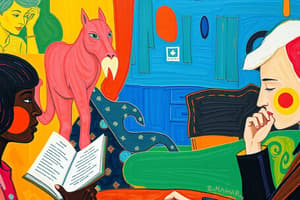Podcast
Questions and Answers
What is literature?
What is literature?
Literature is considered one of the most important forms of art that has helped in the development of civilizations and bridging cultural gaps.
Literature is solely a body of written works.
Literature is solely a body of written works.
False (B)
What does the term 'littera' mean in Latin?
What does the term 'littera' mean in Latin?
- Letters (correct)
- Words
- Art
- Stories
According to Merriam-Webster's Collegiate Dictionary, literature is defined as:
According to Merriam-Webster's Collegiate Dictionary, literature is defined as:
Who introduced the concept of 'Weltliteratur' or world literature?
Who introduced the concept of 'Weltliteratur' or world literature?
Literature functions as a means of both ______ and affirming cultural values.
Literature functions as a means of both ______ and affirming cultural values.
What does the term 'literature' derive from?
What does the term 'literature' derive from?
What is literature?
What is literature?
Literature is only recognized in written form.
Literature is only recognized in written form.
What did Johann Wolfgang von Goethe contribute to the concept of literature?
What did Johann Wolfgang von Goethe contribute to the concept of literature?
How can literature be classified?
How can literature be classified?
The 11th edition of Merriam-Webster’s Collegiate Dictionary defines literature as writings having excellence of ___ or expression.
The 11th edition of Merriam-Webster’s Collegiate Dictionary defines literature as writings having excellence of ___ or expression.
According to Marx, what does world literature arise from?
According to Marx, what does world literature arise from?
Flashcards are hidden until you start studying
Study Notes
Understanding Literature
- Literature is a major form of art that contributes to the evolution of civilizations and modern society.
- Acts as a bridge between diverse cultures, fostering understanding among different nations.
- Defined as the linguistic representation of human thoughts and emotional responses towards struggles and aspirations.
- Reflects the specific cultural, historical, and artistic contexts of the time it was created.
- The term "literature" originates from the Latin word "littera," meaning "letters."
- Represents a compiled body of significant human experiences expressed through well-arranged words.
- Encompasses stories shared across generations, emphasizing the art of language.
- Refers to an author's ultimate expression of thoughts and feelings.
- Merriam-Webster defines literature as "writings having excellence of form or expression, conveying ideas of lasting interest."
- Walter Pater described literature as a representation of factual experiences in diverse forms.
- The concept of "oral literature" exists, indicating that literature is not limited to written text.
- Serves as a means both to critique and uphold cultural values within society.
Concept of World Literature
- Johann Wolfgang von Goethe coined the term "Weltliteratur" in 1827, emphasizing the accessibility of literary works globally.
- He believed in the universality of poetry and encouraged exploration of foreign literary traditions.
- Karl Marx noted that capitalism contributes to a cosmopolitan character in production and consumption, leading to the transcendence of national literature.
- National literature is rendered less meaningful in the face of emerging global literary connections.
- Acknowledges the interdependence of local literatures in forming a broader world literature.
Understanding Literature
- Literature is a major form of art that contributes to the evolution of civilizations and modern society.
- Acts as a bridge between diverse cultures, fostering understanding among different nations.
- Defined as the linguistic representation of human thoughts and emotional responses towards struggles and aspirations.
- Reflects the specific cultural, historical, and artistic contexts of the time it was created.
- The term "literature" originates from the Latin word "littera," meaning "letters."
- Represents a compiled body of significant human experiences expressed through well-arranged words.
- Encompasses stories shared across generations, emphasizing the art of language.
- Refers to an author's ultimate expression of thoughts and feelings.
- Merriam-Webster defines literature as "writings having excellence of form or expression, conveying ideas of lasting interest."
- Walter Pater described literature as a representation of factual experiences in diverse forms.
- The concept of "oral literature" exists, indicating that literature is not limited to written text.
- Serves as a means both to critique and uphold cultural values within society.
Concept of World Literature
- Johann Wolfgang von Goethe coined the term "Weltliteratur" in 1827, emphasizing the accessibility of literary works globally.
- He believed in the universality of poetry and encouraged exploration of foreign literary traditions.
- Karl Marx noted that capitalism contributes to a cosmopolitan character in production and consumption, leading to the transcendence of national literature.
- National literature is rendered less meaningful in the face of emerging global literary connections.
- Acknowledges the interdependence of local literatures in forming a broader world literature.
Studying That Suits You
Use AI to generate personalized quizzes and flashcards to suit your learning preferences.




